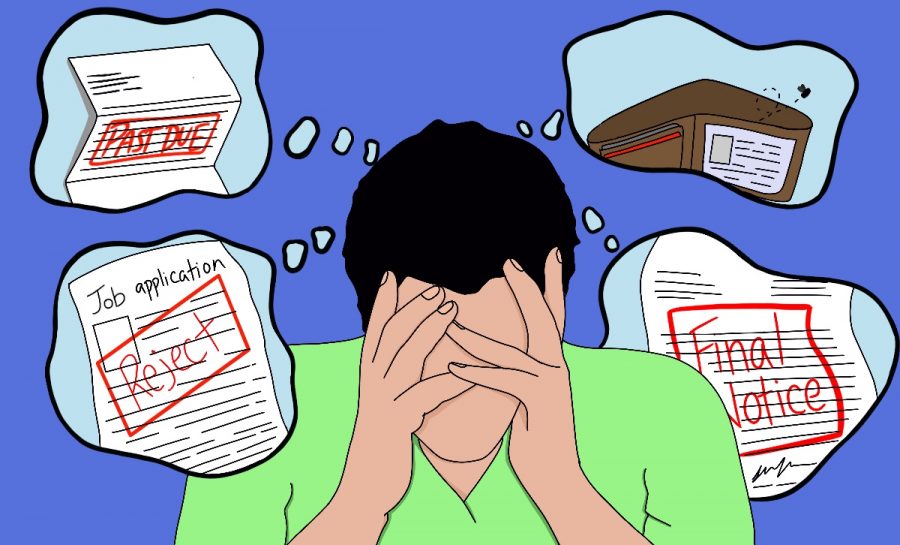Students face unemployment
April 15, 2020
With businesses and facilities shutting down because of COVID-19 many people are left unemployed, according to the United States Department of Labor. While some people have a lot of money saved up, others live paycheck to paycheck. Without having a steady income many people are left struggling to pay rent and other expenses, according to a recent survey done by Clever.
Bryan Cadena, a senior majoring in clinical physiology, just got laid off from working at the CWU Recreation Center. Cadena said the students who worked at the recreation center still have their jobs guaranteed for them when the recreation center opens up again in the fall. Cadena, however, is graduating and will not be returning to work there.
“I’m not too stressed because I have a little bit of money saved up but the thing is when the well runs dry then that is when all the worries start to happen,” Cadena said.
With being unemployed and having to pay the bills, money can run out quickly. At the beginning of every month rent, Wi-Fi and utilities are due, Cadena said. Food is also a big expense. Cadena said he stays pretty active outside of classes working out, so he burns a lot of calories. As a result of his active lifestyle, food has to be bought all the time and it adds up.
“At the moment I am not worried but I just found out we have the stay at home ban for like a whole nother month so that’s even more worrisome not just for me but for other students as well,” Cadena said.
While the government is giving a stimulus check of up to $1,200 to individuals who meet the requirements, it is still not enough for some people. Many college students also won’t receive the check if they are legally a dependent of their parents or guardian(s). Cadena thinks the stimulus check is not enough and wishes more money would be given to people unemployed.
“Honestly that might have been enough for March but we’re already in April and then who knows about May,” Cadena said.
“Imagine the people who live in Seattle, that’s nothing to them,” Cadena said. “People who live in highly populated areas where the price of everything is spiked, that amount of money is not enough.”
“There are people, other students, that live paycheck to paycheck and without these funds coming in they are in a very bad situation where they can’t pay for anything,” Cadena said.
CWU is also offering a funding resource to students as well. ASCWU has emergency funding for students. Cadena said he wanted to apply for the CWU Funding Application but by the time he saw it and tried to apply, it had already closed. He is hoping CWU will give out more funds to students, especially since the stay-at-home order just got extended.
“If they do another one, because this thing is still going on, I’ll apply for the next one,” Cadena said. “Even though I do have a little bit of savings that is what I used my job for to pay for my rent, food, [and] meals on the go if I was on campus,” Cadena said.
Christian Nonga Kingombe, a sophomore majoring in safety and health management, also got laid off from the recreation center. Nonga Kingombe said losing his job has been hard on him because he has to pay for his bills. At the moment he’s trying to find another job.
Nonga Kingombe said he has some money saved up and also has the option of going back home. If he goes back home his dad can give him a job. However, since he has to pay rent for his apartment, he feels as though it would be a waste of money to go back home. Nonga Kingombe said he wished the government would offer more money for people who are unemployed.
“I think they should give more money cause I feel like right now everyone needs help finding a job and trying to find a way to pay off their rent or mortgage or whatever,” Nonga Kingombe said.
Nonga Kingombe also thinks CWU should offer more support. He thinks CWU should offer free housing because he knows a lot of people that don’t have a place to stay.
Karina Avalos-Reyna, a junior majoring in social services, was laid off from her job at the Admissions Office. While she can also go back to work in the fall, she is left unemployed for the meantime.
“[Being unemployed] has really impacted me a lot because I have so many bills to pay,” Avalos-Reyna said.
There are many expenses Avalos-Reyna has to pay such as rent, Wi-Fi, car insurance, utilities and a speeding ticket. Avalos-Reyna said she only has $20 left in her bank account and has been student-charging food gift cards at the Wildcat Shop in order to get food.




Stz Gists • Sep 23, 2021 at 7:23 am
It doesn’t look like most Americans will be getting a fourth stimulus check this year. But some California residents are. Last week, a batch of Golden State Stimulus II payments arrived in bank accounts across California. The first round — amounting to 600,000 payments — went out on Aug. 27; and the Sept. 17 batch was much larger, with at least 2 million Californians receiving the benefit.